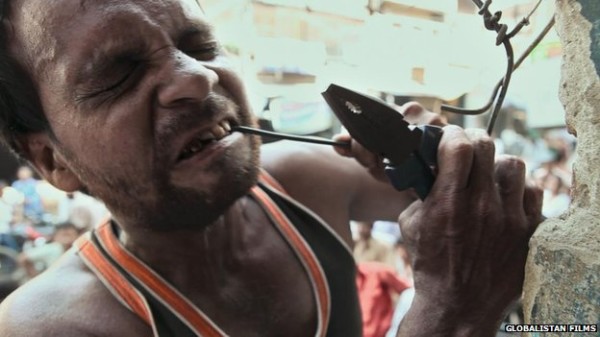
Loha Singh says he steals power for people as the government has failed to provide electricity to all
Why should I be scared of the government when electric current doesn’t scare me? asks Loha Singh, who purloins electricity and provides illegal connections for a living in Katiyabaaz (Powerless), a riveting new documentary on power theft in India.
Singh, an irascible young man with a gift for invective, is the pivot around whom the film rotates.
He snaps off and mangles wires to the main public supply cables for a pittance to provide electricity to scores of homes in a decaying city. His grateful customers regard free electricity as a right or buy stolen power because they cannot afford to buy it. One of the most poignant moments in the film is when Singh returns to his fragile mother in their crumbling family home and she implores him to “leave this dangerous job” and do something honourable for a living. Singh’s eyes well up in a moment of self-realisation of his bleak and hopeless life.
Loha Singh is, at once, the hero and villain of Katiyabaaz. Introduced to the filmmakers Deepti Kakkar and Fahad Mustafa by a drinking buddy, he is a man who, as Mustafa tells me, “typifies [the city of] Kanpur – a swaggering pride arising from having to make do in the most desperate of circumstances”.
Shortages
The film is set in Kanpur, which once prided itself as the Manchester of the East for its thriving factories and is today a derelict city, teeming with people and battling shortages. Thickets of electricity wires hang precariously over congested roads as residents endure up to 16 hours of power cuts a day. Three million residents live without power. Traffic crawls and the air is polluted. Water is scarce.
A well-meaning and seemingly efficient woman officer arrives to take charge of the bankrupt state-owned power supply company. She vows to trim losses, make consumers pay their bill on time and launches a drive against power thieves. She also infuriates a smooth local politician belonging to a powerful regional party who, at one point, barges into her office railing against her initiatives. “Both the poor and rich steal electricity,” she says. “How much can the government subsidise?”
She is right. In Uttar Pradesh, one of India’s most politically influential but electricity-starved states where Kanpur is located, a fifth of the more than 10 million consumers are typically without power at any given time. Transparency International found that the state’s public electricity providers are widely viewed as corrupt.
A study found that power thefts in the state typically rise before local elections, suggesting that it is linked to large-scale theft by people who are likely to vote a politician who turns a blind eye to the problem. Interestingly, the study found that power theft in Uttar Pradesh was more about “political capture of public service delivery by the local elites” rather than political criminality or weak institutions.

Kanpur is a decaying industrial city with severe power problems
In Katiyabaaz, however, both the power thief and his consumers appear to be struggling to live with dignity – and power.
The film, which took two years and 20m rupees ($316,828; £197,869) to make, follows the fortunes of the power thief, the bureaucrat and the politician through a series of incidents in the run up to state elections in Uttar Pradesh.
In the end, the populist pro-free power politician wins the elections. The bureaucrat is transferred to an insignificant town. Harried consumers breathe easy. The power company continues to bleed with a third of its losses caused by power theft. Kanpur still reels under 15 hours of blackouts a day. Loha Singh continues to risk his miserable life as a power thief, snapping wires by day and getting high on cheap booze at night.
“Change is tough,” the polite woman officer says in a revealing interview in her mosquito-infested government bungalow. “I have to take the middle path, use softer options in the beginning. If I start tough, I will go,” she says.
She goes, anyway. The more things change, the more they remain the same. Katiyabaaz holds out no promise of a better-lit future.
In many ways, this dark, moody, slyly political and occasionally funny film is a perceptive commentary on why change is so tough – and complex – in India.



Leave a reply